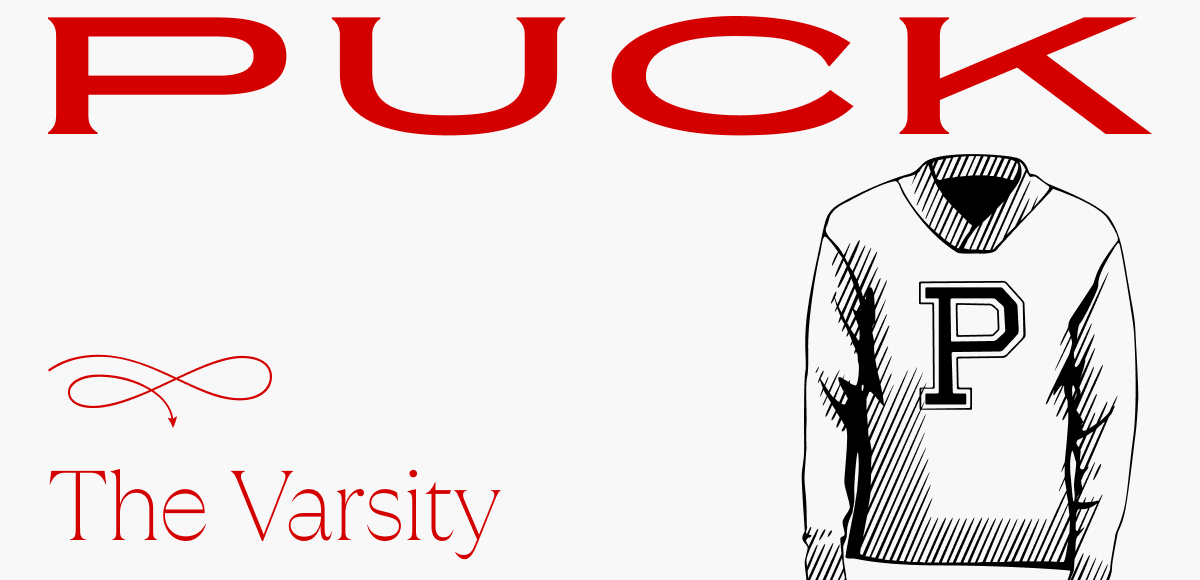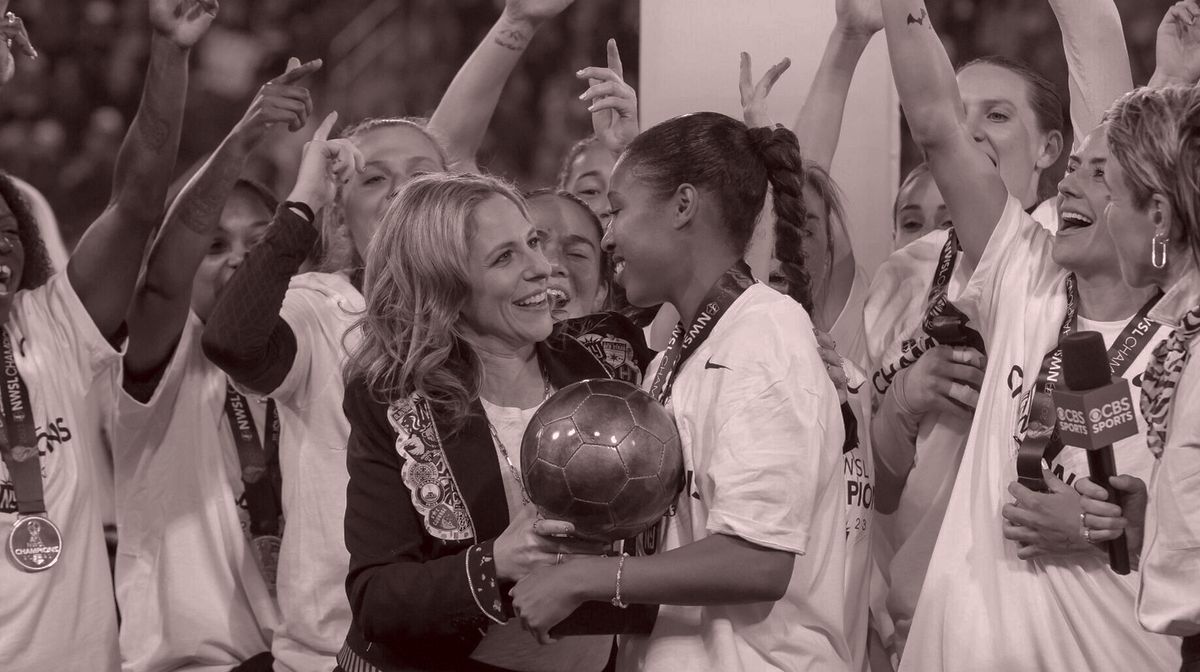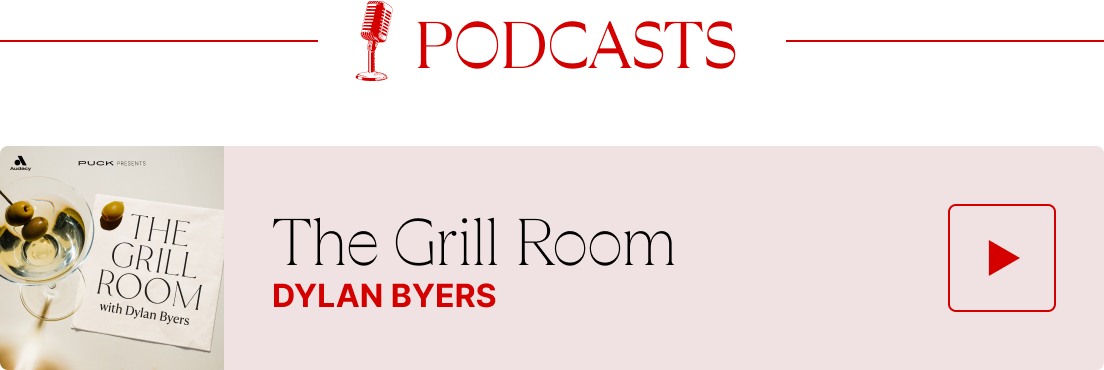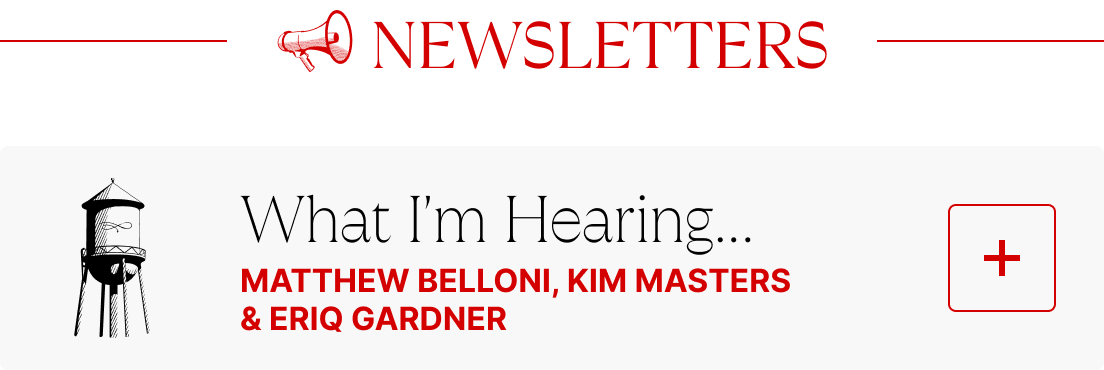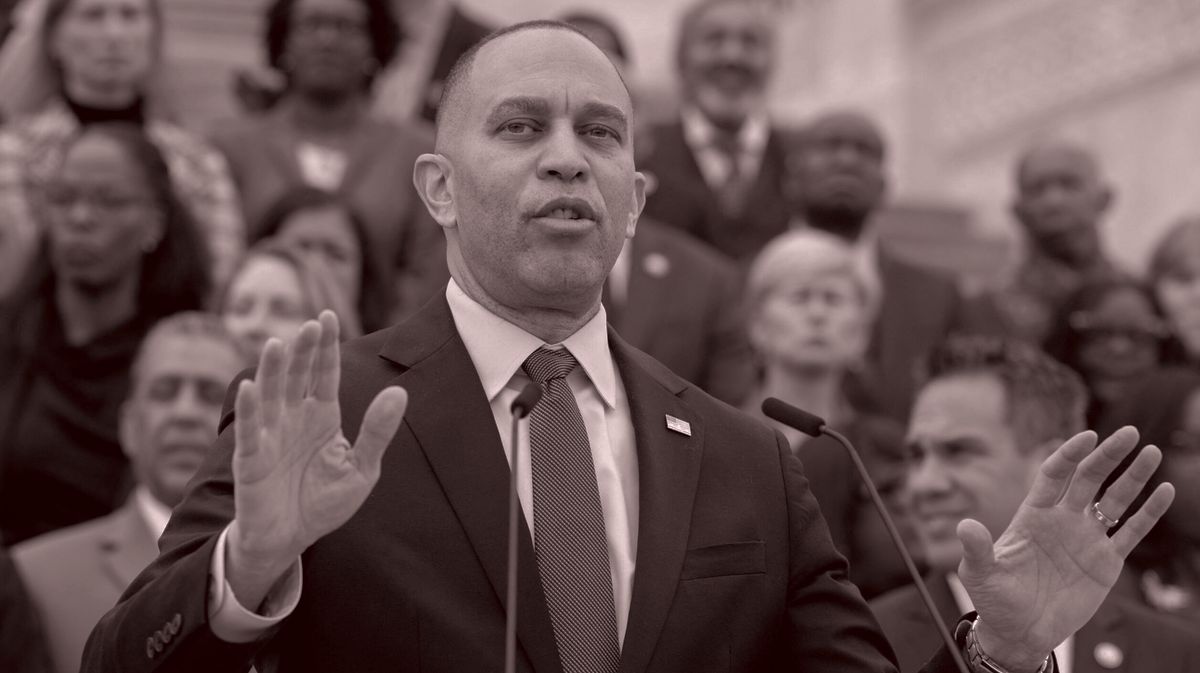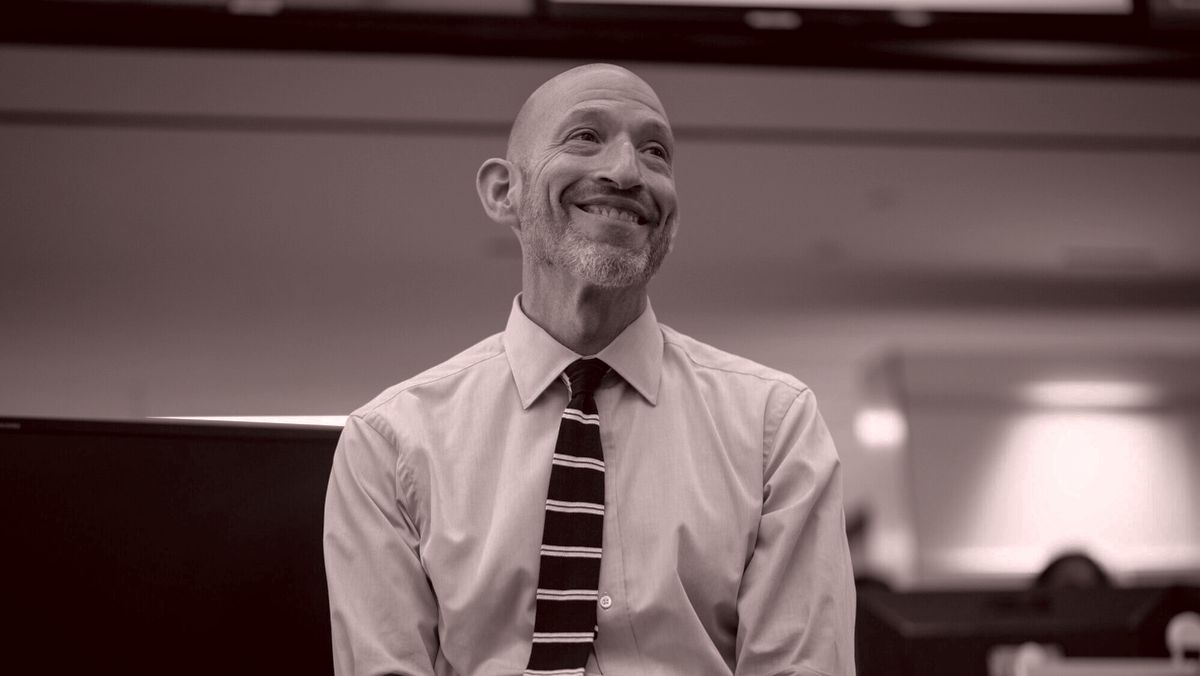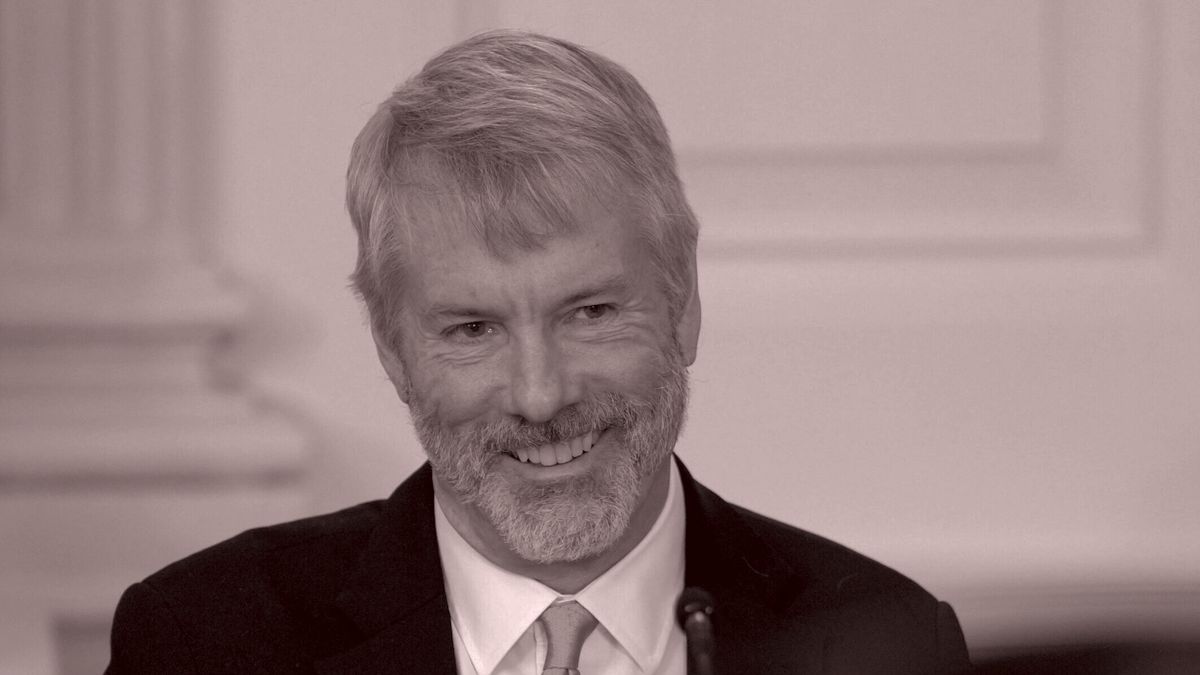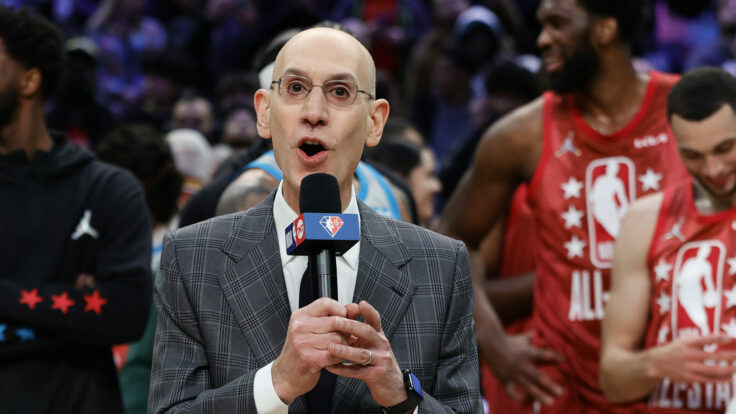Welcome back to The Varsity, my twice-weekly private email on the
conversations that occur—and the deals that are made—after the final whistle. We have some very exciting news coming later this week, but you’ll have to wait just a little longer. I’m in D.C. today, but I’m on my way to Palm Beach for a Thought Leaders event hosted by Guggenheim. Marchand is managing my tee times, so please check with him if you want to get together. (Andrew, please make sure the cooler has a crisp Sancerre—and, remember, crisp does not mean
tart!)
Pod alert: Eamon Lynch, one of the foremost voices in the golf world, joins me on the Varsity podcast Wednesday to tackle the challenges facing the sport, from reunification to falling TV viewership. Lynch, of course, appears regularly on Golf Channel, and writes a hugely popular column for Golfweek. And make sure to check out yesterday’s
podcast, where NWSL commissioner Jessica Berman spoke candidly about what the women’s soccer league needs to do to capitalize on its current momentum. More on that below.
Finally, a personnel announcement crossed my desk right before I hit send: Amazon Prime promoted
hotshot production exec Jared Stacy to vice president of live production. Jared is the guy in charge of all of Amazon’s live sports, which, of course, includes Thursday Night Football, as well as the upcoming NBA and NASCAR productions.
|
- Eriq on Michael Rubin’s legal setback: At long last, a federal judge has given the green light to an antitrust lawsuit against Fanatics, brought by its Italian rival, Panini. The suit accuses Fanatics of monopolizing the sports trading card market through decades-long deals with leagues and player unions. Though Fanatics C.E.O. Michael Rubin has been waiting on a decision for more than a year, the outcome will hardly be a shock, especially
after the judge previously instructed Rubin’s company and Panini to begin the discovery process.
The ruling confirms that Panini has standing to challenge a long-term, exclusive licensing deal, and explore whether Fanatics, through negotiations with licensors, amassed enough power to control prices and exclude competition. Vertical licensing agreements underpin much of the sports business—think, broadcasting—and now the stage is set for a multibillion-dollar legal showdown, one that
could reverberate through other industries that similarly rely on licensing deals. A trial would conceivably feature top executives, and sports experts, testifying about where the business is heading. —Eriq Gardner
- Insta’s X outage moment: This morning, as soon as the NFL’s free agency period opened, Adam Schefter, ESPN’s prolific NFL Insider, scooped that Jaycee Horn had agreed to a four-year, $100 million
deal to stay with the Carolina Panthers, and that Khalil Mack had agreed to a one-year, $18 million deal to stay with the Chargers. The problem was that X, Schefter’s social media bullhorn of choice, where he has 11.4 million followers, was down at the time—part of an outage that lasted for several hours. He pivoted and broke the news on Instagram (2.1 million followers), Threads (611,000 followers), and Bluesky (102,200 followers) instead.
In general, the sports
community has stayed loyal to X, despite all the wonkiness of the Elon era, given that it operates as a good second screen for live sports events. Most ESPN talent use software called Greenfly to post to multiple social accounts at the same time, but Schefter opted to post to each site individually. That included feeding ESPN’s breaking news app, which allows users to sign up for alerts from ESPN’s Insider reporters and where more than a million users are signed up for
Schefter’s alerts. By this afternoon, however, Schefter was back posting on X. Sports fans, of course, will follow their favorite talent anywhere.
- ESPN’s UFC problems: When I woke up Sunday morning to the reports of ESPN+’s problems with UFC 313 pay-per-view on Saturday night—a huge number of subscribers weren’t able to purchase or stream the event—I wondered if it might cause negotiations to go sideways on the league’s next media deal, which
is currently in market. As Varsity readers know, ESPN and UFC are in an exclusive negotiating window that ends April 15. I’m told both sides are planning to allow the window to lapse without a deal, though ESPN may be positioned to keep at least part of UFC’s package, even after it hits the open market.
The Saturday night blunder irritated UFC executives, who saw the outage as the culmination of a series of smaller gaffes. ESPN’s immediate response—to make the event free to all
ESPN+ subscribers—seems to have quieted the outrage, at least for now. Coincidentally, Endeavor’s Mark Shapiro discussed UFC’s pay-per-view model during an appearance at last week’s Morgan Stanley investor conference—days before ESPN+’s problems. “[Pay-per-view] works for us, but we are super flexible,” Shapiro said. He also noted that splitting the package among two mediacos would help UFC expand its reach and engagement. “But we’ve really enjoyed being with one home, as long
as they can hit the price,” he added.
- Dan Hurley and the transfer portal: UConn’s Dan Hurley got the 60 Minutes treatment last night, with Jon Wertheim shedding light on the anxiety and complications of life as a big-time college basketball coach who’s won back-to-back NCAA titles, especially in the player-empowerment era. The segment also
offered insight into why high-profile coaches like Jay Wright and Tony Bennett retired prematurely rather than devote their lives to wooing capricious teen stars and their occasionally avaricious parents. Indeed, the free market system was overdue in an economy where the gains went disproportionately to coaches, trainers,
et al. But we’re still in the turbulence phase of the transformation.
Half his team, Hurley said, is considering jumping into the portal to switch schools. “In a couple of those cases, they’ve already talked to the coaching staff at the future school, and have an idea what their NIL is going to be there,” he said. “The level of volatility in college sports, this has now become a year-to-year proposition. The game has changed completely.” For Hurley, the son of a
legendary high school coach and brother of a legendary college point guard who turned down a chance to lead the Lakers, that must grate.
- Reading list: Some log-rolling on the best stuff I’m reading right now…
|
- This ESPN ticktock about how UNC settled on Bill Belichick is worth a click. The hiring process was “a chaotic search filled with political persuasion that involved now-Secretary of State Marco Rubio, internal backstabbing, the airing of yearslong grievances, and a bitter boardroom
drama that might’ve been more appropriate for an episode of Succession than the hiring of a college football coach.” Then again, Belichick isn’t just any coach…
- New York magazine’s Dave Kaplan profiled the New York Post’s murderer’s row of elder sports scribes: Phil Mushnick, 72; Steve Serby, 75; and Larry Brooks, 74. “Despite the fact that their careers collectively span 150 years at the Post, none of them has plans to quit. … And though they may seem like anachronisms in today’s information environment, they have shown, by putting their personalities first and never forsaking their
credibility, that they are forefathers of new sports media.”
- Since enrolling at Howard, star freshman Blake Harper grew five inches, and is now “one of the most tampered-with players in college basketball,” reports Sports Illustrated’s Kevin
Sweeney, who notes that agents have “come en masse via cold text messages and direct messages on X and Instagram.”
|
And now on to the main event…
|
|
|
NWSL’s Jessica Berman returns to talk about her priorities for the 13th season:
broadcast discoverability, cultural relevance, and the star power of the Triple Espresso. Not necessarily in that order.
|
|
|
The National Women’s Soccer League is about to start its 13th season with a
ton of momentum. Last season, the league set viewership and attendance records (over 17 million total broadcast viewers); it started a new media deal with some of the biggest companies in the business (ESPN, CBS, Amazon Prime Video, Scripps); and it developed crossover stars (Trinity Rodman, Sophia Smith, Mallory Swanson, etcetera). The league’s commissioner, Jessica Berman, joined the Varsity
podcast yesterday to discuss how she can continue that momentum going into this season.
Berman’s game plan was clear. The actual soccer must be top-quality, and the league has to do everything it can to help its players and teams become even more culturally relevant. In our conversation, Berman highlighted the Amazon Prime Series For the Win, which is the league’s first docuseries. She also called on players to be more willing to tell their stories
publicly to draw in casual fans. As always, this conversation has been lightly edited.
|
John Ourand: You have peace
with the union. You set an attendance record last year. Your championship game set a viewership record. As the commissioner of the NWSL, where will your focus be?
Jessica Berman: One area where we are laser focused is on transcending cultural relevance to ensure that more people know the amazing stories of our athletes and the teams. Creating cultural relevance and
discoverability through storytelling is our primary focus on the fan side. We spent a lot of time last season learning about our audience, and figuring out who the addressable audience is. What you’re now going to see is partnerships that are specifically, and intentionally, going after the audience segment that we know and believe, based on our data and research, would be most interested in the NWSL.
One of the ways we’re doing that is through original content. We launched our first ever docuseries on Amazon Prime on March 6. It’s called For the Win, and it followed our eight playoff teams from the quarterfinals to the semifinals to the final.
I’ve seen that in practice. As you know, I live in the D.C. market, where the Washington Spirit’s Trinity Rodman is probably better known
than any D.C. United player or Washington Mystics player.
She’s a perfect example, because she tells her story in a really authentic way in the docuseries. She’s also putting herself out there more, with our encouragement. She was on Alex Cooper’s Call Her Daddy podcast, where millions of people had the chance to hear her story. Trinity is a huge
unlock to the casual fan.
What are other leagues doing well?
The NHL 4 Nations Face-Off was something I really paid attention to. It was interesting to see the way people were so interested in getting behind their nationalities and the countries that are represented in the league. There’s a lot of
analogies to what we have in our league, such as the way the NHL has representation globally—it doesn’t only have American athletes. Part of what made that interesting was that there was real competition from other countries.
What could the NWSL learn from that?
At its base level, it
reinforces what we already know, which is that people really care about the national tournaments. And, of course, soccer is like the ultimate proof case with the World Cup and the Olympics. It’s the question of how you create, market, and scale an event like the 4 Nations Face-Off. More importantly for the NHL, the challenge becomes taking that excitement and bringing it back into the regular season. For example, our league couldn’t have had a more successful Olympics in 2024. We worked really
hard to bring that tailwind into our league.
Did you feel that tailwind? Because hockey does great in the Olympics, but the NHL generally doesn’t see an uptick in TV viewership afterward. Olympic basketball was great, but the NBA saw their early-season viewership actually drop significantly.
You have
to define the metrics you’re looking for. There may or may not be a tailwind that’s directly tied to the next week, or the next month. But it is fair to say that we experienced positive indicators around the success of the Olympics, and players like the Triple Espresso trio of Sophia Smith, Mallory Swanson, and Trinity Rodman.
It’s easy to identify the low-hanging fruit that you’re looking for, like TV ratings or
attendance. And of course those are important. To the extent that happens, it’s great. But it’s also important to look at some of the other things that you might see.
|
The NWSL is one year into the media rights deal with ESPN, CBS, Amazon
Prime Video, and Scripps. Give us a report card.
The most important priority in that media deal was to increase discoverability, to make sure that our games were in the places and spaces where people consume live content, and we accomplished that in spades. From 2023 to 2024, total viewership on our broadcasts through the regular season and playoffs went from about 4 million to over 17 million.
The second thing we wanted to accomplish is to reset the value of our rights. We definitely did that.
The challenge we have as we go into year two of the deal is to begin to build audience and consumer habits around viewership. Knowing that we have our games across four platforms—and to make sure that we’re engaging in more top-of-funnel marketing awareness, more broad marketing initiatives and
strategies to put our athletes and our storylines about rivalries and things that might pique people’s interest—we need to give them the reason why they should watch. Because we know now that if they turn on their TV, they might actually just stumble on our game.
A consistent criticism for many sports is that it’s become too difficult to find games. You have deals with four media companies. Did you
see any red flags there?
People complained about the idea of it before it was in place. When we announced, there was definitely concern about it. But once our season started, we saw almost no pushback. The good news here is that we’re not different. We’re not asking our fans, or future fans, to do something that no one else is asking them to do. The not-so-good news is that it sucks for the sports
fan. If I want to watch a game, I Google to figure out where I can find it, or I ask my 14-year-old, who knows everything. There’s a lot of smart people trying to figure out how to solve this. I know one of our partners, ESPN, is working hard on a “Watch Now” feature, where even if it’s not on their own platform, you can directly link to the game.
You have three more years left on your media deal.
When do you start to negotiate a new one?
Maybe this comes from my collective bargaining background, which is a very different kind of contract, and a very different kind of negotiation: The discussions on your next deal begin the second you sign your deal. Everything that we’re doing is with an eye toward our next deal, and that all started in November of 2023.
What are you looking at to help you come up with a strategy?
We try to think about it through the lens of the things we can control. The industry is going to change so much in the next six months, 12 months, 18 months. We obviously are going to keep tabs on that, and stay close to people whom I respect and trust, and who
are strategic and informed.
It’s not just viewership numbers. It’s the demographics of your audience, and how that relates to brands. It’s about getting really sophisticated about data and research and analytics, both on our own and with our partners.
|
On Fox’s IndyCar coverage: “I was happy to see your coverage of Fox
and IndyCar/NASCAR. I love the pairing, and I’m thrilled to see it will be repeated. I’m so glad the IndyCar viewership numbers were good. Fox brought much-needed energy to IndyCar. Fox clearly—and smartly—took lessons from Sky’s F1 coverage. Plus, they snagged Will Buxton! It’s early, but to me, already a vast improvement over the NBC IndyCar years.” —A cable TV veteran
On
ESPN’s plan to be a sports hub: “That sounds a lot like Apple, but Apple has not been able to pull it off with Netflix, Amazon, and others.” —A Varsity subscriber
On Stephen A.’s $100 million deal: “I can’t wait for your Stephen A. Smith Meter.” —A Varsity subscriber
On
the Marchand trade: “John, do you have any comment on the rumors that you tried to include Andrew in the Brad Marchand trade, but the Panthers threatened to walk away from the deal?” —A Varsity subscriber
[Ed. note: Andrew, stop leaking to the press and pour the Sancerre—extra crisp!]
|
|
|
Finally, a media podcast about what’s actually happening in the media—not the oversanitized,
legal-and-standards-approved version you read online. Join Dylan Byers, Puck’s veteran media reporter, as he sits down with TV personalities, moguls, pundits, and industry executives for raw, honest, sometimes salacious conversations about the business of media and its biggest egos. New episodes publish every Tuesday and Friday.
|
|
|
An essential, insider-friendly Hollywood tip sheet from Matthew Belloni, who spent 14 years in the trenches at
The Hollywood Reporter and five before that practicing entertainment law. What I’m Hearing also features veteran Hollywood journalist Kim Masters, as well as a special companion email from Eriq Gardner, focused on entertainment law, and weekly box office analysis from Scott Mendelson.
|
|
|
Need help? Review our FAQ page or contact us for assistance. For brand partnerships, email ads@puck.news.
You received this email because you signed up to receive emails from Puck, or as part of your Puck account associated with . To stop receiving this newsletter and/or manage all your email preferences, click here.
|
Puck is published by Heat Media LLC. 107 Greenwich St, New York, NY 10006
|
|
|
|
